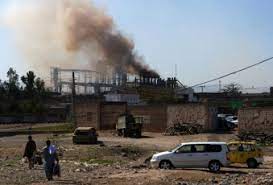Ishaq Khan
PESHAWAR: The Hayatabad Industrial Estate of provincial capital was established in the late 70s and currently more than 550 to 600 units were established, on one hand these factories are providing employments and business opportunities to the local people but on the other hand it created some unavoidable problems to them as well.
Hayatabad Industrial Estate located on the western outskirts of Peshawar, borders the newly merged tribal district of Khyber, formerly Khyber agency of Tribal Areas.
The residents of Shahkas area of Khyber district, adjacent to Hayatabad Industrial Estate and other surrounding areas complained that the Chik board factories in the area makes their lives miserable as these continuously release the production dust, generated during the manufacturing or production process.
There are eight chick board factories in the Hayatabad Industrial Estate, emitting smoke and harmful particles in the air which cause health problems to the local residents.
World Health Organization report claimed air pollution kills around 7 million people in the world every year and adding 9 in 10 people breathe air containing high levels of unhealthy particulates.
It added that breathing fine particulate matter known as PM2·5 can worsen the chronic lung diseases, lead to higher rates of breast cancer, cause earlier onset of neurological diseases like Alzheimer’s and Parkinson’s and increase heart attacks and stroke.
Alamgir Afridi, 35 years old local resident informed that despite submitting several complaints to authorities concerned of taking action against these Chick board factories and making them continue their production without creating health problems to the local people but still no action was taken in this regard.
He claimed that we are consuming this production of dust through our nose and mouth as there is no other way to ensure protection from this dust. All our children were facing severe chest or throat problems especially in the winter season because of these factories and its release of unhealthy particulates in the air, he added.
He further added that they can’t leave the children in open air because of the so much dust and unhealthy particulars in the air, adding we have to clean our houses three to four times in a day as all the dust covering their homes and making in dirty both in looks and hazardous for health as well because of its smell.
Similarly, Safiullah, 53-year-old shopkeeper and resident of Shahkas area said we don’t want to shut down these factories as we understand hundreds of people are working in these units and earning their daily bread from it but we also want a healthy life for our children as it is our basic right.
“Our women and children are compelled to stay in the rooms of our houses mostly in the daytime as these chick board factories continuously emit smoke and dust, sometimes it is impossible to breathe because of so many particles in the air”, Safiullah said.
He claimed that most of the children and residents of the area are facing throat and chest problems because of the unhealthy air quality in the air, adding that the doctors advised to change the locale for good health which is not possible for the most of the poor families of the area.
It is true that district administration, other departments had taken action against these factories on public complaints but unfortunately after some days they continued their productions without taking proper measures in this regard for the safety of common people, he said.
Muqtasid Ahsan, Secretary General of Industrialist Association Peshawar criticized the district administration and Khyber Pakhtunkhwa Environmental Protection Agency (EPA) for destroying the business activities in Hayatabad Industrial Estate with their unfair actions against the different factories in Peshawar.
The products of Peshawar chick board factories were supplied to different parts of the country and in the province because of its fine quality but unfortunately now most of these factories were closed or they shifted their setup to other provinces because of the authorities behavior towards them, Ahsan regretted.
He said that it is understandable and legally right to address the complaints of the local people if they face any problem working in such factories but the EPA or other department needs to aware and train the factory owners and workers in this regard with the aim to ensure the continuity of production and safety of the residents.
He said on one hand the current economic condition of the terrorism stricken and natural calamity hit province had badly affected the business activities and now the authorities are also creating problems with different tactics for the industrialists in the provincial capital.
“We are ready to cooperate with the EPA and administration in any manner but that is not a way to impose heavy fines and seal the factories without guiding them in this regard”, Ahsan said.
While contacting Muhammad Irshad, Chief Analyst and Deputy Director of Environment Protection Agency (EPA) Laboratory, he admitted that EPA received several complaints against these factories for creating unavoidable problems to people, adding that EPA had taken prompt action in the better interest of the people and environment.
He said that three chick board factories are currently in working condition and other factories in this area had stopped production because of their own problems.
EPA official informed these production units were responsible for adding different harmful gases and particles in the air and causing the pollution in the area, adding the short-term standard (24-hour or daily average) of Particulate matter (PM2.5), a non-filterable matter, is 35 micrograms per cubic meter of air (µg/m3) but it crosses the 300 marks in some cases in the surrounding areas of these factories which is very high and could leave negative impacts on human health.
Irshad explained that EPA regularly does inspections in the area and gives notices to those who are not following the rules in maintaining the healthy environment and in some cases we seal the factories according to the rules set by the KP government.







